MELVIN AND HOWARD
| Directed by | Jonathan Demme |
|---|---|
| Produced by | Art Linson Don Phillips |
| Written by | Bo Goldman |
| Starring | Paul Le Mat Mary Steenburgen Pamela Reed Jason Robards |
| Music by | Bruce Langhorne |
| Cinematography | Tak Fujimoto |
| Editing by | Craig McKay |
| Distributed by | Universal Pictures |
| Release date(s) | September 19, 1980 (1980-09-19) (movie) March 2, 2004 (2004-03-02) (DVD) |
| Running time | 95 minutes |
| Country | United States |
| Language | English |
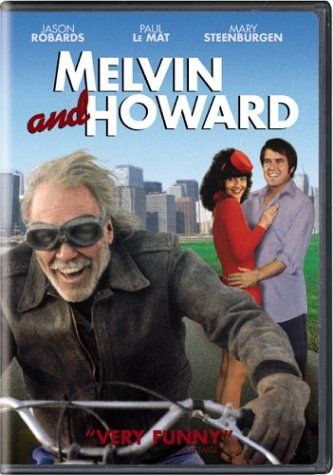
Melvin and Howard is a 1980 American comedy-drama film directed by Jonathan Demme. The screenplay by Bo Goldman was inspired by real-life Utah service station owner Melvin Dummar, who was listed as the beneficiary of USD$156 million in a will allegedly handwritten by Howard Hughes that was discovered in the headquarters of The Church of Jesus Christ of Latter-day Saints in Salt Lake City. A novelization of Goldman's script later was written by George Gipe.
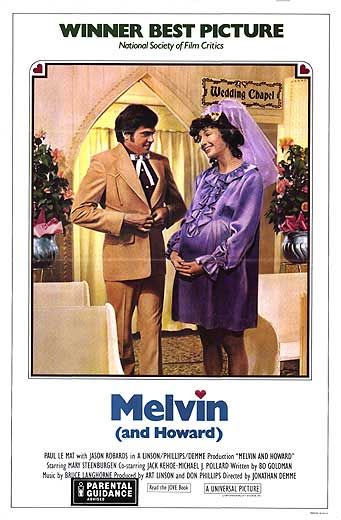
Melvin and Howard is a sweet little film that comes at the tail end of the film renaissance known as “New American Cinema”, which started with Bonnie and Clyde in 1967 and puttered to a close in 1979 or 1980.
Melvin Dummar became a household name after Howard Hughes died as the richest man in the world in 1976, and soon after a will mysteriously appeared in the headquarters of the Mormon church naming the gas station owner as one of the billionaire’s heir. Dummar told the story of finding a decrepit old man at the side of a desert road outside Las Vegas in 1967, and drove him to a hotel. Along the way, the old man claimed to be Howard Hughes. Dummar didn’t believe the man until the will surfaced a decade later. A bitter court battle started which continues to this day.
The charm of this early Jonathan Demme film comes from the fact that it takes Dummar’s story at face value. Mary Steenburgen won an Oscar for her portrayal of Melvin’s first wife, who ran off with their daughter and found work as a stripper. The couple divorced, then married again, then divorced again, and Melvin married an accountant at the milk company where worked as a delivery man. The bulk of the film is spent on Melvin’s trouble home life. There is no attempt to discern if he was telling the truth or not, and the main focus is not on the court battles and media circus, but rather the struggles of a normal working guy who wants to mark out a little place for himself in the world, and suddenly finds himself wrapped up in something much bigger than he ever imagined.
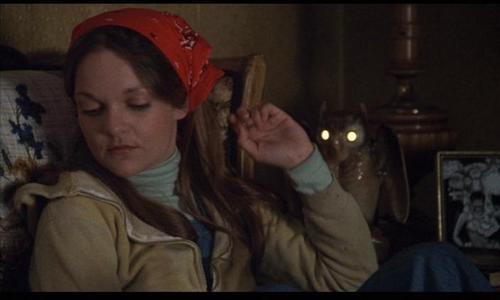
Pamela Reed
Plot
In the opening scene, Hughes loses control of and crashes his motorcycle in the Nevada desert. That night, he's discovered lying on the side of a stretch of U.S. Highway 95 where Dummar stops his pickup truck so he can relieve himself. The disheveled stranger, refusing to allow the Good Samaritan to take him for medical help, asks him to drive him to Las Vegas. En route, the two engage in stilted conversation until Dummar cajoles his passenger into joining him in singing a Christmas song he wrote. The man warms up to his rescuer and before he's dropped off at the Sands Hotel, he identifies himself as the reclusive billionaire.
Most of the remainder of the film focuses on Melvin's scattered, up-and-down life, his spendthrift, trust-in-luck nature, his rocky marital life with first wife Lynda, and his more stable relationship with second wife Bonnie. Lynda leaves him and their daughter to dance in a sleazy strip club, but eventually returns, but she remains frustrated by her husband's futile efforts to achieve the American dream. Melvin convinces her to appear on Easy Street, a game show hybrid of The Gong Show and Let's Make a Deal, and although her tapdancing initially is booed by the audience, she wins them over and nabs the top prize of living room furniture, a piano, and $10,000 cash.
Melvin agrees to invest in an affordable house in a new development, but while Lynda tries to keep their finances under control, he rashly buys a new car and a boat, prompting her to take their daughter and toddler son and sue for divorce. Melvin is comforted by Bonnie, the payroll clerk at the dairy where he drives a truck, and the two eventually wed and move to Utah, where they take over the operation of a service station her relatives had owned.
One day, a mysterious man in a limousine stops at the station ostensibly to buy a pack of cigarettes, but after he drives off Melvin discovers an envelope marked "Last Will and Testament of Howard Hughes" on his office desk. Afraid to open it, he takes it to Mormon headquarters and secretes it in a pile of incoming mail. It doesn't take long for the media to descend upon him and his family, and eventually Melvin finds himself in court, admitting he once met Hughes but vigorously denying he forged the will that finally fulfills his dreams.
Awards and nominations
The film won the National Society of Film Critics Award for Best Film of 1980.
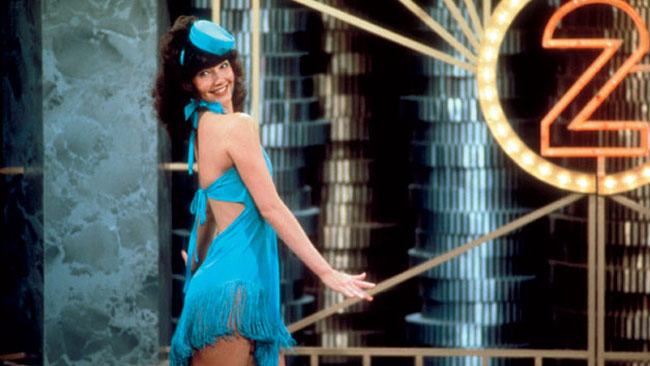
Mary Steenburgen
Mary Steenburgen won several awards for her performance, including:
Academy Award for Best Supporting Actress
Golden Globe Award for Best Supporting Actress – Motion Picture
New York Film Critics Circle Award for Best Supporting Actress
Boston Society of Film Critics Award for Best Supporting Actress
National Society of Film Critics Award for Best Supporting Actress
Kansas City Film Critics Circle Award for Best Supporting Actress
Los Angeles Film Critics Association Award for Best Supporting Actress
Jason Robards was nominated for an Academy Award for Best Supporting Actor and a Golden Globe Award for Best Supporting Actor – Motion Picture, and was honored by the Boston critics.
Bo Goldman won the Academy Award for Best Original Screenplay, the Writers Guild of America Award for Best Drama Written Directly for the Screen, the New York Film Critics Circle Award for Best Screenplay, the National Society of Film Critics Award for Best Screenplay, and the Boston Society of Film Critics Award for Best Screenplay.
Dennis Bingham's Whose Lives Are They Anyway? The Biopic as Contemporary Film Genre cites Melvin and Howard as the first film in the subgenre "biopic of someone undeserving," or "BOSUD," which was later popularized by Scott Alexander and Larry Karaszewski with Ed Wood, Man on the Moon, The People vs. Larry Flynt, and Auto Focus.
Paul Thomas Anderson has cited the film as one of his favorites. Shots in his 2012 feature The Master recall this movie's cinematography. Additionally, Robards' final acting role was in Anderson's Magnolia.
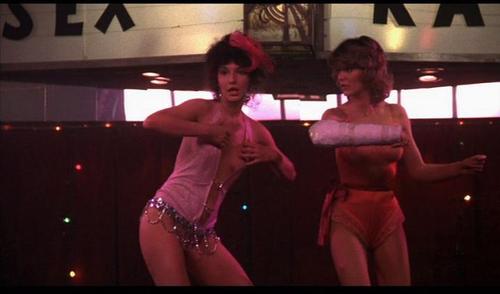
Soundtrack:
- "Amazing Grace Used to be Her Favorite Song"
Performed by The Amazing Rhythm Aces
Courtesy of CBS Records - "Downtown"
Performed by Crazy Horse
Courtesy of Warner Bros. Records Inc.
- "Fortunate Son"
Performed by Creedence Clearwater Revival (as Creedance Clearwater Revival)
Courtesy of Fantasy Records - "Gone Dead Train"
Performed by Crazy Horse
Courtesy of Warner Bros. Records Inc.
- "Hard Way to Go"
Performed by Danny Darst (as Daniel Dean Darst)
- "Hello Walls"
Performed by Faron Young
Courtesy of Capitol Records - "It Came Upon a Midnight Clear"
Performed by Ray Conniff
Courtesy of CBS Records
- "Love Can't Hold a Ramblin' Man"
Performed by Danny Darst (as Daniel Dean Darst)
- "Motlow's Lament"
Performed by Elise Hudson
- "My Kingdom for a Car"
Performed by Phil Ochs
Courtesy of A & M Records
- "San Antonio Rose"
Performed by Bob Wills and His Texas Playboys
Courtesy of MCA Records
- "Satisfaction (Can't Get No)"
Performed by The Rolling Stones
Courtesy of Abkco Records
- "Shake the Ground"
Performed by The Bait Brothers
- "She's About a Mover"
Performed by Sir Douglas Quintet
Courtesy of Crazy Cajun Records
[you can hear this song at 1.12:25 till 1.13:00]
- "Southern Belles"
Performed by Danny Darst (as Daniel Dean Darst)
- "Steel Guitar Rag"
Performed by Buddy Emmons
Courtesy of Flying Fish Records
- "Tennessee Stud"
Performed by Eddy Arnold
Courtesy of RCA Records
- "Windmills of Your Mind"
Performed by Henry Mancini and His Orchestra
Courtesy of RCA Records
- "Bye Bye Blackbird"
(uncredited)
Music by Ray Henderson
Lyrics by Mort Dixon
Performed by Jason Robards
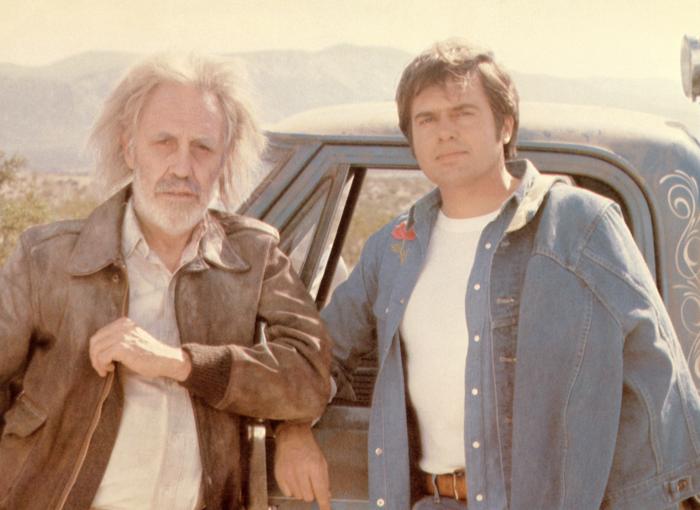
Jason Robards and Paul Le Mat